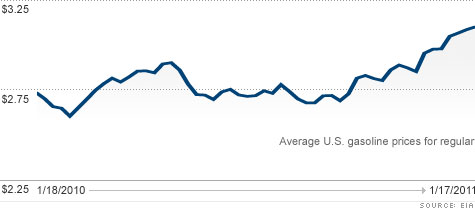 There has been a steady rise in gas prices over the last year. According to AAA, the national average for regular unleaded gas is $3.11 a gallon. Over the last year, prices are up 39 cents a gallon, or 14%. Crude oil is up by a similar percentage, currently trading at just under $90 a barrel.
There has been a steady rise in gas prices over the last year. According to AAA, the national average for regular unleaded gas is $3.11 a gallon. Over the last year, prices are up 39 cents a gallon, or 14%. Crude oil is up by a similar percentage, currently trading at just under $90 a barrel.
Oil prices could hit a record $200 a barrel on rising demand and dwindling supplies, says investor guru Jim Rogers, who predicted the start of the global commodities rally in 1999.
“Known reserves of oil are declining. It is not good news. Unless somebody discovers a lot of oil very quickly, prices are going to go much higher over the next decade,” Rogers tells the BBC.
“The price of oil is going to make new highs. It will go over $150 a barrel. It will probably go over $200 a barrel.”
New reports out this week show demand for oil and gas is up according to API and some analysts say that could mean paying more at the pump. Many experts are saying drivers could be paying $4 a gallon of gasoline this spring. There’s also claims some experts have been under-estimating prices for months.
The gas price increase may be due to several reasons including:
1. Global demand for oil is increasing as China, India and the Middle East are rapidly expanding.
2. Rising interest in crude as an investment can cause higher prices.
3. Winter weather has been extra cold in many parts the US and Europe, creating more demand for heating oil, which can cause an increase in gas prices.
4. The BP oil spill resulted in Obama administering an oil drilling moratorium, which means no more offshore drilling on the Gulf Coast, further reducing the oil supply.
5. OPEC continues to restrict supply.
Fuel Prices and GPS Fleet Tracking
As gas prices continue to rise, more and more people are willing to give GPS fleet tracking a try.
The Aberdeen Group recently concluded that GPS tracking systems have helped companies reduce fuel costs by 13.2% on average. GPS fleet tracking easily improves routing and navigation, dispatching, prevents excessive idling, speeding and personal fleet vehicle use. GPS fleet tracking has proven to reduce fuel costs.
FieldLogix helps keeps vehicle fuel costs low by:
Reducing excessive vehicle idling
Reducing excessive vehicle speeding
Improving the routing of vehicles
Eliminating excessive personal use of fleet vehicles
Improving vehicle maintenance
Ensuring that vehicles do not leave designated areas
Eliminating side jobs
Read more: Jim Rogers: Oil ‘Will Probably’ Soar to Record $200 a Barrel






